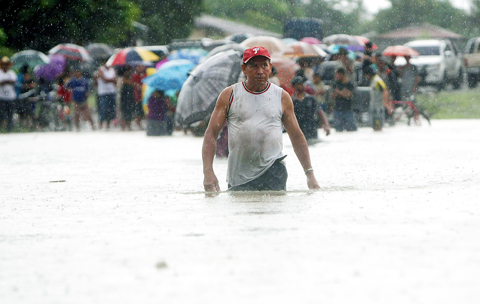The first tropical storm of the season killed at least 101 people across Central America, triggering flash floods and mudslides that swept away homes and destroyed roads, officials said.
Tropical Storm Agatha also forced tens of thousands of people to flee their homes as it whipped heavy rains across Guatemala, El Salvador, Honduras and Mexico.
“The storm has caused 82 deaths,” Guatemalan President Alvaro Colom told reporters. Among the dead were four children in a house that was swept away in a landslide, officials said.

PHOTO: EPA
In neighboring El Salvador, floods and landslides accounted for nine deaths, authorities there said.
In Honduras, emergency management officials reported at least 10 storm-related deaths as Agatha lashed the country, forcing the government to put five of the territory’s 18 departments under a state of emergency. As many as 2,289 people were forced to leave their homes.
Agatha slammed into Guatemala overnight with 65kph winds and was soon downgraded to a tropical depression as it dissipated over higher ground, but the damage caused by heavy rains and high winds prompted the government in El Salvador to declare a state of emergency.
Guatemala had been under a state of emergency since Saturday, while Honduras declared a nationwide state of emergency on Sunday and established a crisis management committee to address heavy flooding and other effects from the storm.
Guatemalan President Colom said flash floods and mudslides forced nearly 112,000 people to flee their homes.
He said schools would remain closed until next week.
The worst storm-related disaster in Guatemala occurred in a village in Solola department where a landslide swept away 25 homes killing 15 people, with another 10 missing, San Antonio Palopo Mayor Andres Cumes said.
To prevent an outbreak of disease, the bodies will be buried at once, he told reporters.
Colombia and the US offered to send aircraft to ferry aid or help with evacuations of storm-hit areas, and Colom said six US military aircraft were en route from a base in Honduras.
Mexican President Felipe Calderon, at Colom’s behest, has offered the airport in the border city of Tapachula for emergency flights in and out of Guatemala, Calderon’s office said.
Guatemala City’s La Aurora International Airport has been closed since Friday after being showered by volcanic ash from the eruption of the Pacaya volcano two days earlier.
Two people were killed and three missing after the eruption on Wednesday.
Vulcanologists at Guatemala’s national seismological institute said activity in the volcano was within a normal range, but its director, Freddy Sanchez, said that “it’s very possible there could be more violent explosions in the coming days.”
Colom said that even though the storm had eased, authorities remained on an emergency footing, adding that there were dozens of towns and villages that were still inaccessible because of roads severed by landslides.
El Salvador President Mauricio Funes put his country under a state of emergency, saying that even though the storm was weakening, the risk of mudslides and flash floods “remains very high.”

FORUM: The Solomon Islands’ move to bar Taiwan, the US and others from the Pacific Islands Forum has sparked criticism that Beijing’s influence was behind the decision Tuvaluan Prime Minister Feletei Teo said his country might pull out of the region’s top political meeting next month, after host nation Solomon Islands moved to block all external partners — including China, the US and Taiwan — from attending. The Pacific Islands Forum (PIF) leaders’ meeting is to be held in Honiara in September. On Thursday last week, Solomon Islands Prime Minister Jeremiah Manele told parliament that no dialogue partners would be invited to the annual gathering. Countries outside the Pacific, known as “dialogue partners,” have attended the forum since 1989, to work with Pacific leaders and contribute to discussions around

END OF AN ERA: The vote brings the curtain down on 20 years of socialist rule, which began in 2005 when Evo Morales, an indigenous coca farmer, was elected president A center-right senator and a right-wing former president are to advance to a run-off for Bolivia’s presidency after the first round of elections on Sunday, marking the end of two decades of leftist rule, preliminary official results showed. Bolivian Senator Rodrigo Paz was the surprise front-runner, with 32.15 percent of the vote cast in an election dominated by a deep economic crisis, results published by the electoral commission showed. He was followed by former Bolivian president Jorge “Tuto” Quiroga in second with 26.87 percent, according to results based on 92 percent of votes cast. Millionaire businessman Samuel Doria Medina, who had been tipped

Outside Havana, a combine belonging to a private Vietnamese company is harvesting rice, directly farming Cuban land — in a first — to help address acute food shortages in the country. The Cuban government has granted Agri VAM, a subsidiary of Vietnam’s Fujinuco Group, 1,000 hectares of arable land in Los Palacios, 118km west of the capital. Vietnam has advised Cuba on rice cultivation in the past, but this is the first time a private firm has done the farming itself. The government approved the move after a 52 percent plunge in overall agricultural production between 2018 and 2023, according to data

ELECTION DISTRACTION? When attention shifted away from the fight against the militants to politics, losses and setbacks in the battlefield increased, an analyst said Recent clashes in Somalia’s semi-autonomous Jubaland region are alarming experts, exposing cracks in the country’s federal system and creating an opening for militant group al-Shabaab to gain ground. Following years of conflict, Somalia is a loose federation of five semi-autonomous member states — Puntland, Jubaland, Galmudug, Hirshabelle and South West — that maintain often fractious relations with the central government in the capital, Mogadishu. However, ahead of elections next year, Somalia has sought to assert control over its member states, which security analysts said has created gaps for al-Shabaab infiltration. Last week, two Somalian soldiers were killed in clashes between pro-government forces and